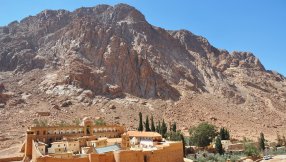Dead Sea scrolls to go digital
Israel Antiquities Authority, the keeper of the scrolls, said it has begun the two-year process to digitally photograph every fragment of the more than 2,000-year-old ancient text.
High-tech digital technology will not only help preserve the manuscripts and make it available to a wider audience, but will also help reveal text that is not visible to the naked eye.
"Just by applying the latest infrared technologies and shooting at very high detail, lots of resolution, we are already opening up new characters from the scrolls that are either extremely indistinct or you just couldn't see them before," said Simon Tanner, director of King's Digital Consultancy Services, according to CNN.
Tanner is on the team in charge of the digital project, which includes Greg Bearman - a retired scientist with NASA's Jet Propulsion Laboratory. Bearman pioneered archaeological digital imaging.
"To switch over to digital is really the way to go, and people were resistant to it initially, because it was a new way of doing stuff," Bearman said. "They want their light table and their magnifying glass."
But with digital imaging, he said, "You can see where the ink has broken away and you can see the texture of the animal skin, so you can see more detail than you can see with the naked eye."
The Dead Sea Scrolls are the oldest written record of the Bible's Old Testament found to date, and include texts that reveal the life of early Christians in the Holy land.
Some were initially discovered in 1947 by a Bedouin shepherd in a cave in the Judean Desert while searching for a lost sheep or goat. The scrolls were found wrapped in linen inside earthenware jars. More scrolls were then found in 11 caves.
"They show the connection between Christianity, Judaism and how everything evolved from the God - the God is one God," said Shor, head of treatment and conservation at the Antiquities Authority. "The scrolls are meant to bring us all together."
The scrolls have only once been photographed in the 1950s, but some of the images have disintegrated, the Antiquity Authority informed.
In the past, people complained that only a handful of scholars could examine the scrolls.
Now, Shor says that the digitalised scrolls can be available in its entirety online to everyone.
"The Bible is sacred to us and to you and to all the monotheistic religions, and therefore [the scrolls] are national treasures and world treasures, and therefore it is our duty to preserve them at least for 2,000 years more," she said.













